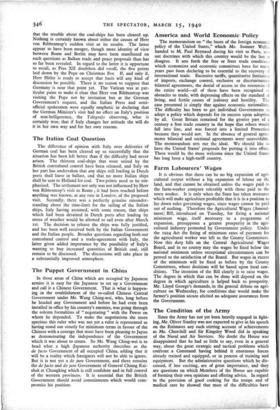America and World Economic Policy
The memorandum on " the bases of the foreign economic policy of the United States," which Mr. Sumner Welk; handed to M. Paul Reynaud during his visit to Paris, se out doctrines with which this country would be the last .0 disagree. It sets forth the free or freer trade conditio-1, which economists and economic committees have for mat:y years past been declaring to be essential to the recovery ,,f international trade. Excessive tariffs, quantitative limitatica of imports, exchange control, exclusive or discriminatory bilateral agreements, the denial of access to the resources of the entire world—all of these have been recognised as obstacles to trade, with depressing effects on the standard of living, and fertile causes of jealousy and hostility. The case presented is simply that against economic nationalism. The difficulty has been to get individual Governments to adopt a policy which depends for its success upon adoption by all. Great Britain remained for the greater part of a century a free trade country in the hope that others would fall into line, and was forced into a limited Protection because they would not. In the absence of general agree- ments bilateral and sectional agreements were unavoidable. The memorandum sets out the ideal. We should like to have the United States' proposals for putting it into effect. These would be the more welcome since the United States has long been a high-tariff country.






















































 Previous page
Previous page